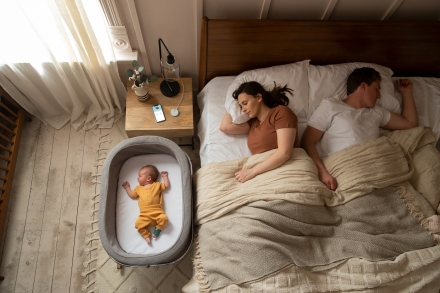Sleep check
You’ve survived nearly three months of a brand new sleeping pattern. You’re amazing! You may be feeling tired as their sleep habits continue to change and you have to adjust your own. Don’t forget the basics.

Be consistent
Set a strict bedtime and wake time for yourself, just like you did for your baby. Consider an earlier bedtime if your baby is an early bird so you can get closer to 7 hours of sleep, even though it will likely be disrupted. Even if you had a long night with frequent feedings, make it your goal to wake at the same time everyday. If you’re tired due to night wakings, try to take short 10-20 minute cat naps throughout the day to help catch up on some sleep.
Create a bedtime routine
You have a bedtime routine for your little one: bath time, feeding, story time, lullaby, then into bed. But did you know that establishing a routine for yourself can be just as beneficial? You don’t have to read yourself a story or take a bath per se, but creating a short routine before bed will help your body recognize it’s time for sleep. Routines can be as simple as washing your face, brushing your teeth, practicing mindfulness, or applying lotion. Be consistent with your routine and your body will respond to those cues.
Avoid heavy meals, excessive alcohol, or caffeine two hours prior to bedtime
You’ll sleep better without a full stomach and with no caffeine after lunch time if you can avoid it. Alcohol may help you fall asleep, but it changes your sleep architecture making the quality of your sleep diminish. And if you’re breastfeeding, avoid caffeine and alcohol altogether as it can be transferred in your milk. The CDC recommends waiting 2 hours per drink to feed your baby or pump after consuming alcohol. If you’re engorged and need to express milk before, then pump and dump to relieve your pressure, though this won’t help to dissipate the alcohol in your system since alcohol stays in your milk like it stays in your bloodstream.
Avoid screens and sunlight as much as possible as bedtime approaches
Closing your blinds can go a long way in helping your melatonin production.
Create the perfect sleep environment
Keep your room cool, dark, and quiet or use a white noise machine. If you’re room sharing, the white noise will help you sleep through the noises your baby produces in their sleep but still hear them if they need you.
When sleep evades you, reset by getting out of bed
If you’re struggling to fall asleep and have been laying in bed for 15 minutes or more, get up and out of your room. Take a small walk around the house, or sit down and read until you feel tired again, then head back to bed to attempt to sleep. If lie in bed fully awake for too long, you’ll find it’s even harder to fall back to sleep. Setting a strict bedtime can be hard to adjust to and it can take 1-2 weeks to adjust to your new schedule. Stick to a schedule and you’ll fall asleep much quicker than you used to.
Bed is for sleep
Your bed is so comfortable and it calls to you when your body is tired and wants to relax. But if you reserve your bed for sleeping only, your body will know you mean business when you lie down and will recognize that it’s time for sleep. You can still lounge on your couch or the floor throughout the day if you need it, but try to reserve your bed for naps and sleep only.
